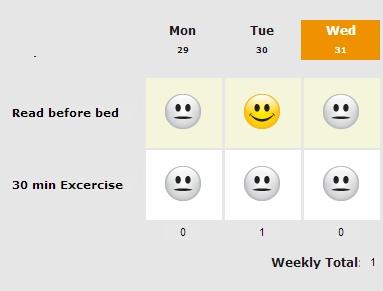Changing Your Life Using Habits
“We are what we repeatedly do. Excellence then, is not an act, but a habit.” Aristotle
In April 2008, I was nearly drowning in $34,000 of credit card debt.
A year later, I not only eliminated all my debt but had also built a passive income source that allowed me to travel the world for more than four years straight.
What made the biggest difference you might ask?
In one word, “habits.”
I believe habits are the single most important factor between success and failure. Habits are the key to accomplishing absolutely anything in life.
This post is all about what I have learned about effectively building new habits and changing old ones.
In the last 10 years I've been fascinated with the science and brain chemistry of habit development. I studied numerous books and performed various experiments in order to find the most effective and easy way to instill healthy habits. It even lead me to develop a software to track my daily habits, goals and tasks, which is now available to anyone.
First let me share a story.
The struggle of feeling powerless
It was a cold Melbourne night and I was driving aimlessly with no real destination in mind.
A full packet of cigarettes was sitting next to me on the car seat. I stared at it for a brief moment and felt anger rekindle in my heart.
The memory of the small smokers booth at Bangkok Airport was still quite vivid in my mind and replayed on a continuous loop.
Being enclosed in a glassy death cube with enormous cloud of yellowish smoke and no ventilation was probably one of the lowest points of my life.
I felt ridiculous and…angry.
Abruptly I stopped the car, got out, and threw the packet into a nearby trash can.
"That was about $100 worth of cigarettes" I thought to myself.
I tried to pretend to be victorious but deep down I knew the truth - I was powerless and severely addicted.
Nothing I’d tried in the last few years worked and this little act wasn't going to work either..
The wonderful and sometimes dangerous power of Habits
The above story illustrates the enormous power of habits.
My smoking addiction was nothing but a strongly ingrained habit that had a dangerous impact on my life.
But not all addictions are negative.
An addiction (i.e. a compulsive habit) is only negative when the activity is harmful. Some are just the opposite as we'll see in a moment.
At this point you're probably curious as to how I overcame my smoking addiction.
The answer is probably not what you'd expect.
No, I did not use any nicotine patch, nicotine gum, nor availed any counseling or treatment.
I…trained for a marathon.
More on that later but the key point I want to make here is that changing this one habit had sparked off a series of changes that would ultimately ripple out to every part of my life.
Replacing smoking with running changed how I ate, slept, worked, and generally felt about myself. It triggered a whole new set of routines and inspired me to seek out a new and empowering future.
Through this journey I came to understand that we are the master and creator of our habits and they can definitely be changed if we understand how they work.
In fact, I believe that understanding the psychology of habits and using it to our benefit might just be the most important thing we can do for ourselves.
Excited? Great! So, without further introduction, let's delve into the mechanics of habits and how they are created.
Understanding Habits - The Art and Science of Habit Creation
By understanding how habits really work, you'll have greater ability to identify patterns that will aid you in making new habits stick.
The habit creation process is a three-part loop:
1. Cue: A stimulus that precedes your habit and tells your brain to go into automatic mode. For example, if every time you drive home from work, you pass a McDonalds sign and crave a cheeseburger. The cue is pretty easy to spot - A big yellow ‘M’ sign.
2. Routine: The series of actions you undertake when you are triggered by a cue (these can be physical, mental or emotional). So in the example above, the brain starts a set of orders that starts with "See a big yellow ‘M’ sign --> crave a cheeseburger".
3. Reward: The immediate benefit you experience as the result of that action. It is easy to identify the reward in our McDonalds example; quick inexpensive meal that tastes extremely good.
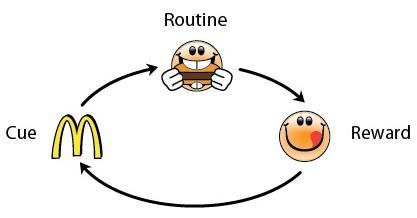
After a while, this loop “cue, routine, reward; cue, routine, reward,” becomes progressively automatic.
Eventually, a habit is born.
Companies spend millions studying customers' habits in order tighten this exact habit loop. Every McDonald’s, for example, looks exactly the same so it can serve as a constant cue. And their food is deliberately and repeatedly engineered to deliver immediate rewards.
We usually don't pay attention to the patterns that create our habits. By being aware of them we will be in better position to challenge habits that don't server us.
Which brings us to our next point.
How to Effectively Change Unhealthy Habits
Do you remember how I mentioned that training for a marathon helped me to stop smoking?
Well, it did not happen right away.
During the first week of training I was still smoking but I noticed that my nicotine cravings disappeared after each training session. More importantly, this craving-free feeling lasted for hours.
So I decided to try something a little crazy. I went for a short run each time I had a craving. This meant that occasionally I ran a few times a day but after a couple of weeks I was free from cigarettes 🙂
It took me a while to see the big picture, but at some point it hit me: Replacing unhealthy habits with healthy ones is much more effective than just stopping them.
Let's say you want to stop eating unhealthy snacks. The question, then, is what will you do or eat instead?
If snacking gave you the pleasure of eating something sweet, How about replacing it with healthy sweet dates?
On the other hand, if snacking helped you to stave off boredom, how about dealing with the boredom?
Perhaps going for a walk instead will relieve the boredom and wipe out the desire of eating at the same time.
The idea is simple. For every habit you want to change, you come up with an alternative routine that will be triggered by the same cue.
It would not only make the adjustment easier but also provide an identical reward as the old unhealthy habit.
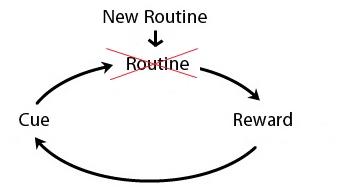
How to Make Your New Habits Stick
If you've tried incorporating new habits before, you already know that making them stick can be tough.
What frequently happens is that we usually start out strong and then end up sliding back into our old habits after only a few days.
I'm sure you know the feeling.
The skill of making desired habits stick is the most important part of our discussion and it holds the key to successfully and dramatically changing our lives.
I'd like to suggest a simple but extremely effective 4-step process to mastering this skill.
Step 1 - Identify Key Priorities
Let's face it; no one can get every single thing right.
Instead, it's more effective to identify key priorities and turn them into powerful levers that will ripple through other areas of your life.
In other words, some habits matter more than others.
Where to start? Here are some suggestions of beginning positive habits:
1. Read or meditate before sleeping
2. Exercise or go for a long walk every day
3. Get up 30 minutes earlier and get some things done
4. Eat one serving of vegetables during lunch
5. Eliminate one snack of junk food
6. Drink 3 cups of water first thing in the morning
7. Work on your dream business instead of watching evening TV
8. Give up coffee and replace it with herbal tea
9. Call or email a friend, family member, or business contact every day
10. Write in your journal or on your blog every day
11. Socialize or go out every night
These are examples of keystone habits that have the power to start a chain reaction which are likely to transform your life.
For instance, when an exercise routine is firmly established, other habits, such as diet and sleeping, fall into place on their own.
Lastly, aim to tackle just a few habits at a time and start with something that is both important and realistic. You can always upgrade your list later when you feel more comfortable with the process.
Step 2 - Build a Powerful Habit loop
The second step is to properly identify the components of your habit loop.
First, identify the routine. This is quite obvious; it is the behavior you want to adopt.
Be specific. If your new desired habit is running, how long or how far would you run? Is it a daily or near-daily habit? Would you rather run alone or in a group?
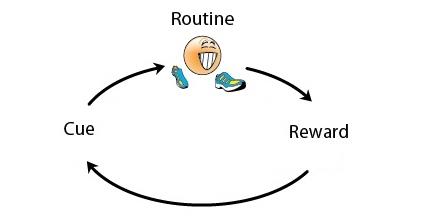
Next is to reinforce a simple but powerful cue for your routine.
This is the first link in the chain of a habit which can help you to eventually control the entire behavior.
The majority of habitual cues fit into three categories:
Location - Where exactly would you be?
Time - When exactly would you start?
Scenario - What will serve as a reminder?
Note that I used the word “exactly” a couple of times. By making a new habit more uniform, it will be easier to follow and eventually get more consistent.
So with our running example, a good cue would be to leave your sneakers next to your bedroom door and lace them up as soon as you wake up.
I ran a few marathons thanks to this simple cue 🙂
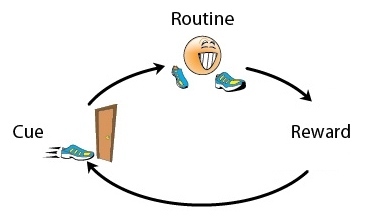
Finally, what would be the reward?
Be clear. Will it be a morning treat such as a yummy smoothie? Maybe the sense of accomplishment gained from tracking miles will be the motivating key? How about the endorphins rush and burst of energy that comes from a jog? Or maybe all of them? 🙂
By having a clear expectation of the reward, a craving for the new activity will naturally develop. In turn, your brain has created a new autopilot!
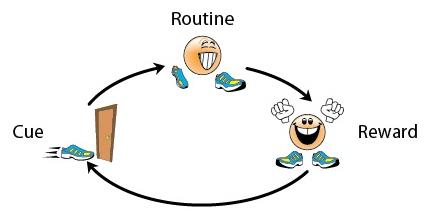
Step 3 - Start a 21-day Challenge
We already know that getting started and sticking with a new habit can be challenging. Most of our energy, which takes the form of willpower and discipline, is spent in the first few weeks.
For this reason, the third step is a commitment to implement the new habit for 3 consecutive weeks. No exceptions.
By week 3 the new habit will be a reflex, requiring minimal mental energy to maintain.
The 21-day challenge works because that is roughly how long it takes for the brain to adjust to the change. Less is usually not enough and more can seem like an overwhelming commitment.
Once you completed your 3-week trial, you can decide if you want to go back to your old habits or continue with your new lifestyle.
Having done many of these trails in the last decade, I’ve found that doing them greatly increases the likelihood of habit formation. A trial is less intimidating to our mind than deciding on a permanent change from the start.
The power of this tool lies in its simplicity. It is important to choose trials that can be done every single day without exception. Otherwise it is too easy to skip a day, lose interest or give up altogether.
This brings me to the final point.
Step 4 - Track your progress
Completing all 3 weeks is essential to the process of creating a new habit. To be successful it is imperative that you maintain consistency which can be a struggle.
Most people quit after a week, not because of lack of willpower, but because they either lose motivation or simply forget.
Tracking progress will help address these two issues and lead to success.
After years of trying different habits and goals software I decided to create my own. It's simple, fast, and extremely effective. And best of all, it is free to try! Take a few minutes to check it out at GoalsSoftware.com .
This simple but powerful tool will motivate you to stick with your habits and, in addition, add a bit more fun to the whole process by giving yourself a daily score.
Like many other principles here, it will only work if you use it. Give it a try.
Last Words and Your First Step
A wise man once said, "We are all at the mercy of our wild monkey minds. Incessantly swinging from branch to branch."
What he meant is we are all creatures of basic habits, repeating the same behaviors over and over through the course of the day.
Of course, from time to time we're able to control our mind to overcome an unhealthy behavior but unfortunately our willpower and self control are limited. We can consciously resist a temptation for a while, but that is all we're doing -- resisting.
It's only through the habits which we form, which allows us to make genuine and lasting changes in our life.
In fact, the only reason I could finish this long post is thanks to a daily writing habit. Without it, this post would not have seen the light of day.
So my advice to you is to start today and start slow.
Think of one or two habits you'd like to form and make it official by recording it on paper or in a Goals Software
It takes only a few minutes but it has the power to change your life.
Live Out Your Dream!
P.S If you found this article helpful, please forward it to someone you love and click the sharing buttons below. The world is a better place when people actively follow their dreams.
* If you're looking for more inspiration to help you on your personal development journey, you may want to check out my extensive list of SMART goals. This page is packed with thousands of different goal ideas that can help you set new aspirations and reach higher heights in your life. Personally, this page helped me to create my own 100 life goals list, which I pursued for over a decade.
Chief Editor
 Tal Gur is an author, founder, and impact-driven entrepreneur at heart. After trading his daily grind for a life of his own daring design, he spent a decade pursuing 100 major life goals around the globe. His journey and most recent book, The Art of Fully Living, has led him to found Elevate Society.
Tal Gur is an author, founder, and impact-driven entrepreneur at heart. After trading his daily grind for a life of his own daring design, he spent a decade pursuing 100 major life goals around the globe. His journey and most recent book, The Art of Fully Living, has led him to found Elevate Society.

